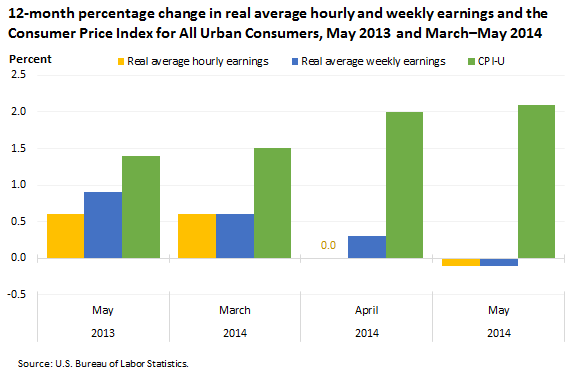An official website of the United States government
 United States Department of Labor
United States Department of Labor
In May 2014, the 12-month change in real average hourly earnings for all employees was -0.1 percent; in May 2013, it was 0.6. The 12-month change in real average weekly earnings was also -0.1 percent in May 2014; a year earlier it was 0.9 percent. The May 2014 declines in real average hourly and weekly earnings resulted from a 2.1-percent increase in average earnings offset by a 2.1-percent increase in the Consumer Price Index for All Urban Consumers (CPI-U).

| Month | Real average hourly earnings | Real average weekly earnings | CPI-U |
|---|---|---|---|
May 2013 | 0.6 | 0.9 | 1.4 |
Mar 2014 | 0.6 | 0.6 | 1.5 |
Apr 2014 | 0.0 | 0.3 | 2.0 |
May 2014 | -0.1 | -0.1 | 2.1 |
In April 2014, real average hourly earnings were unchanged over the year; real average weekly earnings were up 0.3 percent in the 12 months from April 2013 to April 2014, while the 12-month change in the CPI-U in April 2014 was 2.0 percent.
In March 2014 the 12-month changes in both real average hourly and real average weekly earnings were 0.6 percent, while the 12-month change in the CPI-U in March 2014 was 1.5.
These data are from the Current Employment Statistics program. Data for the most recent 2 months are preliminary. To learn more, see “Real Earnings — May 2014” (HTML) (PDF), news release USDL-14-1136. Information from the Consumer Price Index program is used to adjust the earnings estimates for inflation.
Bureau of Labor Statistics, U.S. Department of Labor, The Economics Daily, Real average hourly and weekly earnings in May 2014 at https://www.bls.gov/opub/ted/2014/ted_20140619.htm (visited March 03, 2026).

Recent editions of Spotlight on Statistics
